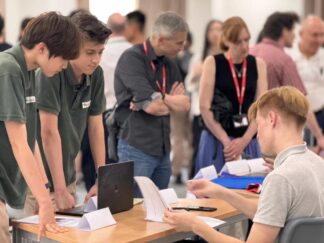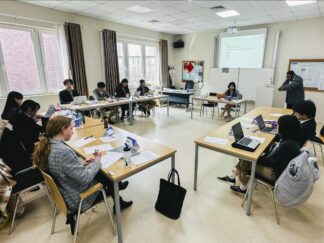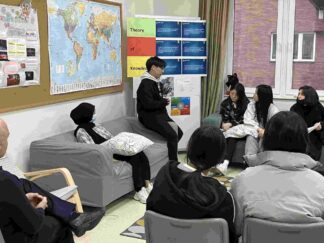Diploma Programme (DP)
The International Baccalaureate Diploma Programme is designed for students aged 16 to 19.
An Overview of the Diploma Options at Hanova
Xi’an Hanova International School is fully authorized to offer its students the IB Diploma Programme (DP) – one of four programmes offered by the IB. It is a programme of international education designed to help students develop the knowledge, understanding, attitudes and skills necessary to participate actively and responsibly in a changing world.
Hanova provides two basic diploma options for students in Year 13. Students may opt to undertake the full International Baccalaureate (IB) Diploma or the Hanova Diploma, which will be based upon the IB Diploma. The academic subjects and core components in both diplomas are exactly the same and are assessed according to official IB Diploma criteria. The only real difference between the two options is that students undertaking the Hanova Diploma will not study as many subjects as those required for the IB Diploma.

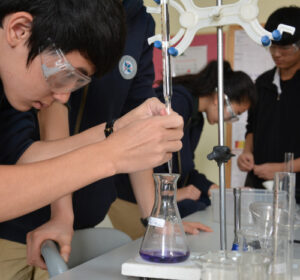
- Students undertaking the Hanova Diploma option are still expected to attend TOK, Extended Essay and CAS lessons and meetings in Years 12 and 13. They must complete a ‘TOK Exhibition’, a 2500 word ‘Extended Essay’ and must have completed CAS ‘experiences’ and/or ‘projects’ that fulfill all the CAS Learning Outcomes.
- Once they have successfully met these requirements, they do not have to continue classes and/or meetings in these ‘core components’. Based upon their interests and/or needs, a Hanova Diploma student may wish to be formally entered for one or more of the IB DP ‘core components’.
- In order to be qualify for the Hanova Diploma, students must also meet the basic passing requirements of a total of 20 points for 5 subjects. Hanova Diploma students must attain only one subject with a grade 3, and grade 4s for the rest of the subjects.
- Hanova Diploma students must achieve at least levels ‘D’ for both the Extended Essay and the TOK after moderation conducted by the EE coordinator, TOK Coordinator, DP Coordinator and the EE supervisor.
- Hanova Diploma students must complete at least one CAS Project and have reflections on CAS Experiences that have covered all 7 CAS Learning Outcomes.
- Hanova students must pass their IB Diploma subjects during the ‘Mock’ examinations in the DP2 with a total of 20 points ,and only one subject with a “3”.
- In addition, all of our Diploma students – whether he/she is taking the IB Diploma or the Hanova Diploma – needs to participate in the IB Core Components of the Extended Essay, the Theory of Knowledge (TOK) and the Creativity, Activity, and Service (CAS).
- A Hanova Diploma student may decide to be officially entered for one or more ‘Core Components’ depending upon their needs and university aspirations.
- If a Hanova Diploma candidate is not formally registered for the Extended Essay or the TOK or the CAS, they are still required to undertake the school-based assessments. It entails writing a 2500 words ‘Extended Essay’, completing a TOK exhibition and having a balanced CAS programme. Hanova Diploma students are also required to attend the TOK classes even if they do not have to write the TOK Essay in DP2 (Year 13).
We are an inclusive school and it is important that all our students share the same learning experiences and opportunities. Therefore, all students will study the same IB Diploma Subjects whether they are doing the IB Diploma or the Hanova Diploma. Students of both Diplomas will be taught in the same classrooms, learning from the same curriculum and to sit in the same examinations. All students will receive the official IB certificates based upon what IB subjects and/or core components they enter for and to pass successfully.
Since the official IB Diploma subject results are not published until July, Hanova Diploma students will be awarded their diplomas according to the internal ‘predicted grades’ given by their subject teachers and confirmed by passing the ‘Mock’ examinations in February or March every Under the previous conditions: a total of 20 points and only one subject with a grade of “3”.
As with all Diploma students at Hanova, in the event that a Hanova Diploma student is in a ‘failing condition’ in any subject, the IB Diploma Coordinator will alert the student and the parents immediately.
Being an inclusive school, Hanova will encourage and support students wishing to do the full IB Diploma programme as far as possible. Therefore most students will start Year 12 undertaking the full IB Diploma.
However, if a student does not meet the minimum passing requirements – as indicated below – the school reserves the right to move the student into the most suitable Hanova Diploma option at the beginning of Year 13.
hanova offers two diploma options through our ib diploma programme
Two Basic Diploma Options for Hanova Students
IB Diploma
Hanova Diploma
See our Diploma Programme in action!
Take some time to look through some of the most recent DP events and activities at Hanova:
Encouraging students to become active, compassionate and lifelong learners
Hanova's IB Diploma Programme Model
This diagram represents the programme model of the IB DP. At the centre is the student, which symbolises the central importance of the learner. Around the student is ‘Approaches to Learning’ and ‘Approaches to Teaching’. The significance of these are that teaching and learning in the Diploma – the ways we teach and the ways students learn – is now integrated into all subjects and core components.
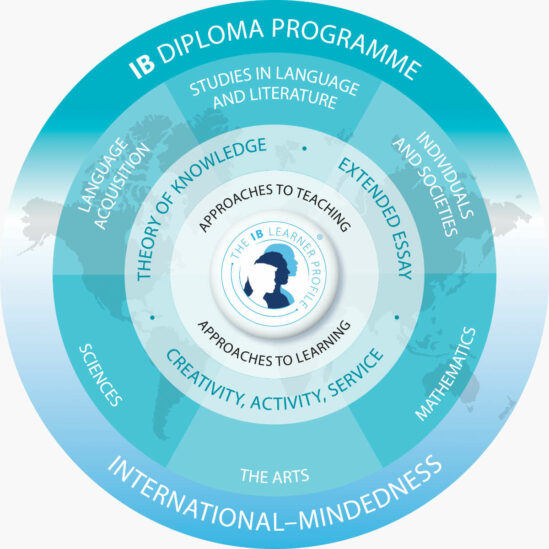
The core components of the programme, including Extended Essay, Theory of Knowledge and Creativity-Activity-Service, surround these, and again, increasing these core components are integrated into all of the academic subjects. Since our aim is that our students become global citizens of the future, international mindedness is reflected in all the academic subjects as well.
Diploma Programme Assessment, Projects & Service
This programme, one of the three offered by International Baccalaureate® (IB), is a rigorous two year pre-university education programme, leading to examinations, for highly motivated students aged 16 to 19 years old. For those of you familiar with other education systems, it is an alternative to UK A-levels and US AP, but in our view ensures a much more balanced programme of study without compromising the depth required by university admissions systems throughout the world.
The International Baccalaureate Organization (IBO), founded in 1968, is a nonprofit educational organisation based in Geneva, Switzerland. The IBO is a recognised leader in the field of international education and is currently working with over 4,000 schools in 150 countries and areas to develop and offer IB programmes to almost 1,5 million students aged 3 to 19 years.
The IB Diploma Programme (DP) follows a pattern, which is consistent throughout IB schools worldwide and which allows internationally mobile students to transfer from one IB school to another. In the USA, achievement on an IB Diploma Subject Course, Diploma or Certificate, is seen as a sound basis for awarding credits at most of the major universities. In the UK, Europe and Australia, the IB Diploma is held in high regard by major universities and acts on its own as a university entrance qualification.
The IB DP is much more, however, than a series of academic subjects. Its unique additional features of CAS, Extended Essay and Theory of Knowledge ensure that students are made aware of their community responsibilities, are encouraged to develop their research skills and become independent thinkers. The underlying philosophy is that students should share an academic experience that would emphasise critical thinking, intercultural understanding and exposure to a variety of points of view.
IB Diploma students not only gain a real head start at university but also in life in general. More information on the IB DP is available on the IBO public website: www.ibo.org. Using the link http://www.ibo.org/country will allow you to search all universities in the world which recognize and welcome the IB Diploma as a suitable entry requirement. The link http://www.ibo.org/diploma/recognition/scholarships also shows universities that offer scholarships for recipients of the IB Diploma.
The DP Core Components are compulsory and central to the philosophy of the IB DP. The Core Components are:
Extended Essay (EE)
The EE has a prescribed limit of 4,000 words and offers the opportunity for students to investigate a topic of individual interest and equips them with the independent research and writing skills expected at university. It is intended to promote high-level research and writing skills, intellectual discovery and creativity. It provides students with an opportunity to engage in personal research on a topic of their choice, under guidance of a supervisor.
Theory of Knowledge (TOK)
The interdisciplinary TOK course is designed to provide coherence by exploring the nature of knowledge across all the subject groups, encouraging an appreciation of other cultural perspectives. Theory of Knowledge encourages critical thinking about knowledge itself and aims to help you people make sense of that they encounter. Fundamentally, TOK asks the question, how do we know what we know?
Creativity Activity Service (CAS)
Participation in the school’s CAS programme encourages students to be involved in a range if activities alongside their academic studies. Creativity, action, service (CAS) encourages to be involved in activities as individuals and as part of a team that take place in local, national and international contexts. Creativity, action, service enables students to enhance their personal and interpersonal development as well as their social and civic development, through experimental learning, lending an important counterbalance to the academic pressures of the rest of the IB DP.
Students undertaking the full IB Diploma or the Hanova Diploma will be assessed in every subject and core component by fixed assessment criteria. By the end of the two-year Diploma Programme, students will have been assessed both internally and externally in ways that measure individual performance against stated objectives for each subject.
During the course of the Diploma Programme, students will be assessed in a variety of ways, including written assignments, essays, projects, oral presentations and commentaries. Many of these are assessed in the school and are called Internal Assessment (IA).
Every year in May or November, all IB Diploma and Hanova Diploma students will undertake their final written examinations in their subjects. Our examination session is in May. These examinations are marked by examiners outside the school and are therefore called External Assessment (EA).
The weighting of marks between Internal Assessment and External Assessment varies between the subjects. However, it is typical that a subject will have Internal Assessment components that count for at least 20% of total marks available. Internal Assessment is very important and, if done well, certainly has a positive influence upon final subject grades. However, at Hanova we have strict regulations governing all the Internal Assessments.
Internal Assessment (IA)
There is an evident connection between what students achieve in their subject IAs and what they go on to achieve in that subject overall. It seems to be that students can under-estimate the true value and opportunity afforded by the IA components and under-achieve in these when compared to their final written examination components.
In order to ensure that this examination component is undertaken in a clear, consistent and ethical manner, the school will implement several measures.
External Assessment
There In May of the second year of the IB DP, students will undertake IB Diploma examinations based on two years of teaching and learning.
Due to the degree of objectivity and reliability provided by the standard examination environment, externally marked examinations form the greatest share of assessment for each subject.
The grading system is criterion based (results are determined by performance against set standards, not by each student’s position in the overall rank order); validity, reliability, and fairness are the watchwords of the DP’s assessment rubric and philosophy.
DP students follow six courses: three at Higher Level and three at Standard Level. The points awarded for each course range from 1 (lowest) to 7 (highest). Students can also be awarded up to three additional points for their combined results on the Extended Essay and Theory of Knowledge. The highest total score for the IB Diploma that may be awarded is 45 points.
Requirements for successful passing of the Hanova's IB Diploma Programme
The maximum score possible for students pursuing the IB DP is 45 points; representing up to 7 points in each of the six required courses (42 points) plus 3 possible bonus points for Theory of Knowledge and the Extended Essay components. An IB DP candidate must reach at least a total of 24 points, or an average grade of four in each of their class. To a certain extent, a high grade in one subject can balance a poor grade in another (e.g. a 5 in English can offset a 3 in mathematics).
To be successful in the IB Diploma students should achieve:
- In total 24 points or more from their six required courses (12 points or more in their Higher Level subjects and 9 points or more in their Standard Level Subjects)
- No grade of a 1 awarded in any Higher Level or Standard Level Subject
- There are no more than two grade 2s awarded (SL or HL).
- There are no more than three grade 3s or below awarded (SL or HL).
- Completion of the Creativity Action Service (CAS) requirements
- There is no “N” awarded for TOK, the EE or for a contributing subject.
- There is no grade E awarded for TOK and/or the EE.
- The candidate has not received a penalty for academic misconduct from the Final Award Committee.
In addition, candidates who have completed these conditions through multiple languages may be eligible for a bilingual diploma. A bilingual diploma will be awarded to a successful candidate who fulfills one or more of the following criteria.
- Completion of two languages selected from the studies in language and literature subject group with the award of a grade 3 or higher in both languages.
- Completion of one of the subjects from the individuals and societies, or sciences subject groups in a language that is not the same as the candidate’s nominated studies in language and literature language. The candidate must attain a grade 3 or higher in both the studies in language and literature language and the subject from individuals and societies, or sciences subject groups.
Pilot subjects and interdisciplinary subjects can contribute to the award of a bilingual diploma, provided the above conditions are met. The following cannot contribute to the award of a bilingual diploma.
- An extended essay
- A school-based syllabus
- A subject taken by a candidate in addition to the six subjects for the diploma (“additional subjects”)
The table below shows the subjects that can be studied at Hanova in each of the academic groups during the academic years 2021-2022. Students must select three Higher Level (HL) and three Standard Level (SL) subjects. In combination with the subjects, students are required to fulfill the requirements of the Core components of TOK, EE and CAS to gain full certification in the IB DP.
Group 1 – Language A | Group 2 – Languages | Group 3 – Individuals and Societies | Group 4 – Experimental Sciences | Group 5 – Maths | Group 6 – Arts and Electives |
Chinese A: Language and Literature H/SL | English B: H/SL Chinese B H/SL | Economics H/SL | Mathematics: Analysis and Approaches HL | Visual Arts H/SL | |
Chinese ab Initio SL | Geography H/SL | Biology H/SL | Mathematics: Applications and Interpretation SL | History H/SL | |
English A: Language and Literature H/SL | Spanish ab Initio SL | Chemistry H/SL | |||
Korean A: Language and Literature H/SL | Social Anthropology H/SL | Physics H/SL |
At Hanova, we believe that in most cases, students should take a broad and balanced programme by selecting one subject from each group. This is especially important for students who wish to keep their university options open. We actively encourage students to ensure that the subjects they select are appropriate for university entrance, will maximize their potential and provide satisfaction and enjoyment. Students who are selecting a second Science or Humanities course as an Elective in Group 6, must provide reasons for selecting the course, for example, “I plan to take Engineering at Toronto University and to apply I must study Mathematics HL, Physics HL and Chemistry HL or SL”.
Hanova students apply and has been accepted to a range of universities throughout the world; destinations include mainly United Kingdom, USA, Canada, Australia, China (Including Hong Kong),Japan, Singapore, South Korea and also other countries in Europe and Asia. Our graduates are studing at the most prestigious universities such as the University of California, Los Angeles (UCLA), Boston College in the United States, University College London (UCL) in the United Kingdom, Yonsei University,Chung-Ang University in the South Korea, McGill University in Canada,ect. For more information, please refer to our university page.
All elite universities recognise and value the IB Diploma programme, because it is a rigorous program that stresses interdisciplinarity, internationalism and extra-curricular activities – all key attributes for future global citizens. These institutions tend to be flexible in terms of the subject requirements to study for most degree programmes but are nevertheless demanding in terms of the total points that must be achieved. The points awarded to a student at the end of the IB DP will be the most important factor in determining the course of choice, wherever the destination.
The main exceptions to this rule tend to be in the STEM areas of study and here it is possible to give clear guidelines. The choices that matter will be the Higher Level subjects rather than those at Standard Level. It is vital that students carry out research to be certain that the subject choices at Higher Level are appropriate and applicable for the university course they may be interested in studying.
Elite universities around the world now want to see that students have challenged themselves, with very demanding academic activities that stretched over several disciplines, as strongly recommended by the IB Learner profile.
